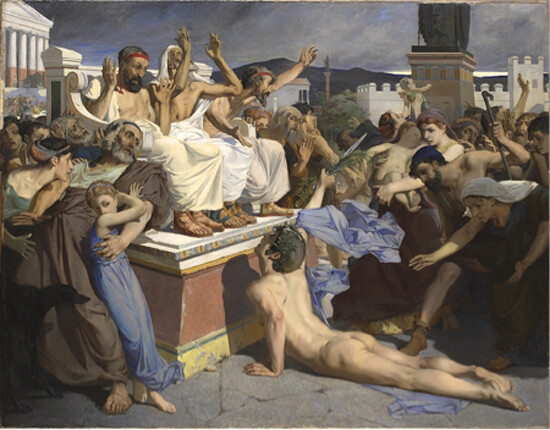And pairs that cannot absorb one another in meaning effects
Go backward and forward and there is no place
—Lisa Robertson, “Palinodes”
No one lives in the future. No one lives in the past.
The men who own the city make more sense than we do.
Their actions are clear, their lives are their own.
But you, went behind glass.
—Gang of Four, “Is It Love?”
Over the past few decades, it has often been said that we no longer have an addressee for our political demands. But that’s not true. We have each other. What we can no longer get from the state, the party, the union, the boss, we ask for from one another. And we provide. Lacan famously defined love as giving something you don’t have to someone who doesn’t want it.1 But love is more than a YouTube link or a URL. This beautiful negative flip of what is commonly considered the most positive force in the universe helps us begin to see love’s fullness and endless bounty, as based in emptiness and lack—in mutual loss. Love’s joy is not to be found in fulfillment, but in recognition: even though I can never return what was taken away from you, I may be the only person alive who knows what it is. I don’t have what it is you’re missing, but knowing its shape already makes a world where you can live without it.
Now it becomes easy to see how love translates to economic terms as a union based in mutual debt. When the debt is paid off or called in, the union dissolves. And now that pretty much everyone is in debt, love abounds! Professionals are moving back in with their parents, people are returning home to their countries to depend on their extended families, contracts are increasingly backed by personal relationships, and even the values of goods and currencies are backed less by bonds and legal tender and more by the trust and intimacy that gives them their character. Shared associations and affinities expressed over communication lines produce pockets of enormous value in an otherwise lonely ocean of random data streams. Musicians record reams of songs without ever thinking about wanting a record contract from major labels that are still struggling to understand how to make money off computer files.
Musicians produce music for pure communication now. Information and communication turns immaterial economy into superstition and affective projections. Capital defers down to pure communication, and what used to be an idea of the collective has become a force of conviviality in the absolute. Information-driven overstimulation and actual impoverishment may have fallen in love with each other as well, and they shack up together on an unemployed person’s Facebook page. Now that we live a constant slump, what used to be called biopolitics has been accelerated to the degree that it starts to line up with older pre-capitalist and pre-mercantile means of stabilizing exchanges. Why, after all, do you think there is so much talk about feudalism these days? And how did you suddenly get so many friends that you don’t even like? Where do you think we got all the bromance films—Hollywood romantic comedies on Platonic love between immature men with nothing in common who are nonetheless forced to improve difficult circumstances by forming bonds of intimacy and solidarity? Neighborhood currencies appear, not only in places like Greece, to keep goods and services moving when the money system breaks down. The currency could be a stone or a handshake—it doesn’t matter and doesn’t even have to be material when it’s backed by bonds of trust, by family love, or by friendship. All that is capital melts into love.


Love is the most recently introduced member in the family of inflation and bloat. It is a burst of fresh air fed straight into the bubble. It gives the Ponzi scheme at least another decade before people start to think about cashing out. Remember when you would run out of time and replace that with energy? Push a little harder and move a little faster and you can trick time, because darling you’re a superhero. But when you run out of time and energy alike, you run into a problem. You need help. You need support. You need love and a bit of tenderness. Now, with the help of others, you can feed the machine again.
Without time and energy of your own, love is the conduit through which you extract the time and energy of others. You then start to take the shape of that loving conduit. But you have also become a professional lover—or a diabolically good flirt. You are a kind of Marilyn Monroe or Don Juan in the labor of other Marilyns and Dons. This arrangement actually makes for a beautifully collective endeavor so long as you can stay beautiful, tender, and kind to your lovers, and so long as they stay that way to you. This tenderness is a force of resynchronization. Maybe it is a new kind of force altogether. Maybe it is love time. Let’s inhale and exhale together.
Love is in this sense not an elevated romantic phenomenon but the economization of empathy. Love is immaterial capital in the absolute in a sphere of value relations where capital and labor are no longer the main operators or arbiters of value. As unfixed capital summons higher and higher symbolic registers into the arena of exchange, its increasing abstraction puts it constantly on the prowl for a lower base to peg value to. But we now find ourselves in a moment where the situation has taken hold to the point where we are no longer really talking about value in an economic sense, but rather about how to sustain meaning in its most fundamental semantic and ontological sense. And this meaning is provided by the base-level foundations for life and for identification, for solidarity or for support, in reproductive and affective relations, from childbirth to friendship.
There is also an idea that solidarities between people within the sphere of capital are capable of compensating for the inequities produced by capital, and that this constitutes a kind of exception to the economy within it. But in fact these solidarities are the very essence of what regulates the flows of value and compensate for its inconsistencies through promises, favors—the handshake or the handjob. Kisses and compliments cost nothing and mean everything, like the phrase “sweet nothings” to describe lovers’ whispers to each other. It is not through the “nothing” but the “sweet” that semiotics becomes material when plucking the strings of the heart. Love abounds on information networks—like a home, every inbox is a cacophony of emotions, of simple pleasures, seething frustrations, of unconditional support and permanent disavowals, of silent treatments and gushing confessions. It is through bonds of solidarity that all the things that that cannot be registered and accounted for—because they are irrational and errant and ill defined suspended interactions—find their place, either due to tolerance or an ability to codify or both. In this sense, what I am talking about is a bloat in the sphere of mutual solidarities, a bubble that is no longer economic but will only burst as an aneurism or an uprising—its effects will not be registered according to any language so far understood as being within the realm of economy. Even if Marx did give us a premonition in his closing lines of “The Power of Money”:
Let us assume man to be man, and his relation to the world to be a human one. Then love can only be exchanged for love, trust for trust, etc. If you wish to enjoy art you must be an artistically cultivated person; if you wish to influence other people you must be a person who really has a stimulating and encouraging effect upon others. Every one of your relations to man and to nature must be a specific expression, corresponding to the object of your will, of your real individual life. If you love without evoking love in return, i.e., if you are not able, by the manifestation of yourself as a loving person, to make yourself a beloved person, then your love is impotent and a misfortune.2
When in love, giving and receiving have no calculus; they have infinite supply and demand. Just as in lovemaking, giving pleasure and receiving pleasure are indistinguishable from each other to the extent that they are in fact no different. Meanwhile, care labor, raising children, and all of these so-called labors of love make public service and private interests swirl around and mesh, giving and receiving pleasure and love. The question of love is the phantom that hangs over the question of work. It is both a radicalization of the concept of work by way of mashing it with life (with or without the creative class promises) but also what comes after work—at the end of the workday on the one hand, but also when there are no jobs and people have to make do by sharing their skills with each other. The unemployed member of the family is usually expected to care for sick relatives or babysit. Their occupation is to love, and it is always a lot of work. Here, love becomes a figure of total depletion, even a catholic figure of giving oneself away to the point of exhaustion and humiliating defeat. We look a mess because we have given our love in the absolute, to the Absolute. To have nothing left to give is to start looking like Christ on the cross—after the passion. To help someone walk when they are not related to you is social love. Many people remark on how teaching is a joy in itself.3 The shifting of labor into the private and domestic spheres is on the one hand a reallocation of resources from state or workplace into the private and personal sphere of the home. But, with self-managed and free-floating labor, it is also marked by a sliding of troubles from the office or factory to the home, the marriage, the partner, the mind, the children. Every day is bring your kid to work day as well as never take a shower or change out of your fucking pajamas day. Under the auspices of love, a generalized generosity form has emerged within the private and public sphere alike. Through the family, the lover, the market, the street, a machine of reciprocity now stretches horizontally from horizon to distant horizon across a flat landscape converting labor into love and love back into labor. Love is a promise converted to a curse converted back to a promise.
Essentially both blur into an expressive force with seemingly no addressee in established political structures or aesthetic regimes, and whose underside is a depletion so cruel that we can only cry ourselves to sleep at night. It is a perverse advancement of the Romantic project as a concretization of romance. The Romantic era was a surge of energy released by the potential of an era of revolutions in the late eighteenth and nineteenth centuries. Today we live in a similar era, but now the energy has no addressee and is extracted under the auspices of a liberation that no one really believes in.
As capital cancels itself, differences in value do not just go away. The management and regulation of those differences don’t go away either. Negotiations within those differences assume the terms of exchange, which is to say they reflect them and reinforce them, producing and reproducing them. We are really in a time of hyper-paradox where sign value and use value converge and split and converge again too fast for money to even make sense. Every price mechanism is faulted. Marx or Debord’s darkest warnings about capital and spectacle and price speculation are a decent but ultimately gloomy manual for understanding the way things are. Even if the neoliberal economists of the Chicago School are the architects of this condition, they themselves have a hard time explaining what is happening without the help of an astrologist or meteorologist or shaman. If this means the eventual and complete death of economics, only to be replaced by love, the transition might be bumpy at first but it won’t be such a bad thing in the long run. Of course, this regime change will be disastrous for many relationships, but how can you complain when you are witnessing the phasing out of work and its replacement by friends? Maybe you thought you were still looking at contemporary art—but actually art left the building quite a while ago and the artist is mostly using the real estate to work a gigantic production job of stabilizing an image of career trajectory in the absence of any social or art historical one.
Today it has become disturbingly easy to confuse stress and exhaustion with love. This can be attributed to the sheer amount of energies being exchanged that prey upon emotional responses.4 And only in recent years have we learned that we are no longer talking about work or labor capture but about the distribution of vital energies that surpass the calculus of both. While some of these energies are politically beneficial or monetize in ancillary or surprising ways, the physics of application doesn’t really account for how much energy is poured into forms of political or lyrical expression out of love or fun or idleness or pathological commitment—that is, without asking for anything in return.


There may be a whole other side to the situation that we have only started to ascertain through the political uprisings of recent years, where a form of political commitment gets displaced onto the expressive sphere. Much has been written about the role of images and blogging in these movements while most of us know what a poor user interface these forms are for negotiating the common, which has changed so radically that the very location of the common itself has probably shifted elsewhere. While there is a great deal to look forward to in this fact alone—the dislocation in terms of site and objective have left so many people vulnerable to forms of pathological commitment that can risk coming unhinged from their political objectives, and ultimately consume the people themselves. We are forced into these situations to consider how solidarity works to surpass structural limits by bonds of trust and reciprocity, but also about the stresses placed back on those very solidarities when a structure is so bankrupt that it can only permanently rely upon informal generosities for its basic vital functions. This is to say that love is both the problem and the solution to an emerging form of hyperactive, supercommitted self-application that surpasses logics of exploitation and labor extraction because no one is really benefitting from the added value when it evaporates under the auspices of love or dedication.
We might also be looking in the wrong places, because things do not only evaporate when they enter the expressive sphere, but are also catalogued and archived by the NSA, by museums, any other infrastructure dedicated to historical memory and surveillance alike. A pathological commitment that defers to the expressive sphere when it hits a political impasse has to then contend with the politics of artistic form in order for it to hold together. The language of that form is increasingly being defined by its ability to access emotional registers. This is probably why we are finding so many people in the arts who are essentially activists continuing their work in the absence of any concrete political horizon, but who also become in the meantime the most beautiful singers in the tradition of a Baez or Om Kulthum. Put simply, expressions of the fullness of being have moved from the structural to the symbolic and emotional registers. One of the most widely-read texts speaking to this is not coincidentally by Plato, who brought us divine and rational love. But Plato’s Phaedrus is all about using wordplay to seduce a lover, and it is also about using seduction to inspire wordplay—which leads to a semiotically-inspired madness. You master a text not by solidifying its internal logical structure, but by knowing and loving your audience, even to the point where, as in Phaedrus, you can convince them to want to sleep with you. Rock’n’roll figured this one out a long time ago.
But rock stars also die young. Or they become fat, they become bloated, they become depressed with age. On the one hand, the scale of amplification of their symbolic output is nearly impossible to reverse, and on the other they are tied to a form of symbolic production structured around youth and vitalism and libidinal surplus that is impossible to sustain with age. The human heart is the most banal metaphor for love, but is also a physiological timekeeper. Many athletes suffer from a condition where the heart swells to become too large as a result of overexertion.5 Essentially, even if you are a marathon runner fully endowed with the endurance and stamina to run enormously long distances with ease each day, your body will nevertheless collapse after some time.6 And yet, it remains extremely hard for athletes and trainers to identify when the limit to overexertion has been reached, as the tearing of muscle tissue is likewise the prompt for the muscle to grow and become stronger. Pheidippides ran from Marathon to Athens, where he collapsed and died to deliver a message of victory in the form of a single word: νικῶμεν (victory).


Many thinkers today are fond of reminding us that, in spite of information technology’s implicit claims to immateriality and free-floating copy-paste generosity and all-around deterritorialized accessibility, the internet has a material base that makes it subject to scarcity, national boundary policing, traditional state surveillance, etc. It’s totally true. But don’t be misled into a Marxist-materialist line of thinking that the materiality of the internet fully accounts for what it is doing to us. Other thinkers (Bifo, Geert Lovink) have at moments suggested that it is the emotional content that travels over the lines that the stresses and limits to information exchange are to be found. Badly written emails, trigger-happy responses, and breakneck turnaround times lead to a kind of psychotic swamp of affect and emotional feedback loops, and this is where the apparent immateriality of information finds its final form—not in infrastructural bonds but in the melting and reforming of personal and loving bonds. And what it seizes upon most ferociously are people who can absorb and mediate the burdens of the people around them, and the emotional baggage that is the secondary infrastructure of the information economy. These are the real high financiers, the fat cats of affect economy—nurses, single mothers, good listeners, generous thinkers, party organizers, dinner hosts. The internet is only a metaphor for this much larger atmospheric superhighway of emotional dementia. They are the mesh. You thought they were only making potato salad and cookies for the picnic, but actually they are the central nodes and the real server farms in a telepathic meta-network and probably our last hope.


So, it looks like we are entering an era of profound love. The construction of the modern subject from the Western Enlightenment on through the Scientific Revolution advocated a mechanistic view of the world that inadvertently sought a kind of stabilization of life and causal relationships through a natural order. Peace and prosperity follow. Infrastructure would be built accordingly. Labor would be specialized, the train would arrive on time and take you where you want to go, the garbage man would keep coming on behalf of a large organization that does not want to have you living surrounded by your own waste. Yet, when infrastructure breaks down, we start to develop special powers—such as telepathy. The evil eye returns; envy becomes a material force. God returns because faith becomes necessary. Not only the starving peasant finds comfort in the cross or in the face of Jesus Christ. We all start to look up to the stars and planets and feverishly read our horoscopes hoping no one notices, or interrupts. But what is love in this context?
Love becomes a society without the state, to paraphrase Pierre Clastres. Love within strong and well-managed infrastructural conditions is explained with transcendental and highly personal terms—we are meant to be together, we are made for each other. We have so much in common. We are a private commons within the society. Love is allowed to be platonic and never opportunistic, and only the most wretched or destitute people marry the child of a factory owner for that reason, for a passport, etc. But when the trash man stops showing up, everything starts to marble and flip. Infrastructure turns to love and love becomes infrastructure. The son becomes the trash man. True love becomes a healthy family business, with children as its labor force. The economic mobilization of love might explain how love can be used to territorialize close communities. It doesn’t explain how much power these communities actually hold through those very bonds, through their ability to dissolve the apparent necessity of making alliances with power structures that don’t offer any immediate form of reciprocal support simply because they are there.


None of this is new. In fact, it’s incredibly old. For peasants and farmers the world over this is and has always been completely basic. And in areas that supersede or evade infrastructure, whether politics or organized crime, family bonds always translate into strategic interests, but also into the relations of trust that sustain the society.7 Love never claims to be unbiased, because it is a highly subjective affair. Why anyhow should I love someone out of some universal principle when my own family is suffering? This is the question that Mao set out to answer when he launched a campaign against Confucianism as part of the Cultural Revolution. In order to build a free society, the authority of Confucianism had to be smashed and replaced with a moral code that included the state as the primary arbiter of relations between people. This was the only way to even begin thinking of resolving the severe class differences that plagued China’s history. Confucianism was a kind of Mafia family code locking China into the feudal system that blocked the kind of clarity and administration needed to transition the country into the modern world.8
Surely this is what Zhou Enlai, Mao’s second in command was thinking when he so beautifully proclaimed that “it’s too soon to tell” whether the French Revolution succeeded yet. We must see love as a radicalization of the integration and confusing of the public and private spheres. On the one hand, when Thatcher proclaimed there was no such thing as society, that there are only people, she was making an argument for true love—not the state-subsidized universal love driven by some ethical idea of equality. Families and friends, a true conservative love. But to return to Lacan’s formulation, when the stakes are lowered even further—say, following Thatcher—there is very little to be given or received other than affection and emotional support, promises and white lies, and maybe even some personal ethics to hold it all together in the meantime. Thatcherite savage realism knew that the state administered public sphere is something no one really had and no one really wanted that much anyways. But like the falling or fallen tyrants everywhere are being forced to discover, a tyrant called love is coming.
Jan Verwoert has often adapted this to the best definition of art I’ve ever come across.
Karl Marx, Economic and Philosophic Manuscripts of 1844 →
Is there on the contrary a logic that subtracts mutually? See Envy, Extreme jealousy, Evil Eye, Evil, Misery, Satan.
See Franco “Bifo” Berardi, “The Future After the End of Economy,” e-flux journal 30 (December 2011) →
Thanks to Evgeny Shkaraburov for informing me of this after a jog.
See the report published by the New England Journal of Medicine on the increase in cases of sudden cardiac arrest following long-distance running races in the US between 2000 and 2010: →
Confucianism in China is probably the best example of how family love can function as an organizing principle strong enough to sustain society without central command or mediation by state bodies. Because Confucianism in a nutshell implements a command structure within the private space of family relations, the social order is doubly protected from instabilities outside by basic solidarities backed by blood, love, and seniority. On this level Confucianism is essentially a moral code based in absolute unwavering obedience to one’s own family elders, and to one’s self by juniors in the family. And while many cite Confucianism as the popular belief system that sustained Chinese civilization for millennia in spite of wars and regime changes, its stabilizing effects come at the expense of social inequities between various clans and families, between women and men, between young and old. Confucianism is not egalitarian and does not aim to be. Powerful families stay strong, and the weak families stay weak.
The universal cosmic love declared by nineteenth century utopians like Charles Fourier was always an attempt to formulate how love could be socialized, transitioned from the sphere of family and sensual attraction to an ethical, universal human responsibility between people. And the more bizarre and extreme aspects of Fourier’s thinking, which was in his time attributed to his personal eccentricity as a person, should also be understood as a tacit recognition of how difficult and projective and even phantasmagorical the idea of universal love always must be, and the idea of equality by extension.
Parts of this text were sourced and edited by Metahaven for their video City Rising, 2014. After many iterations, its debts are to Franco Berardi, Diana McCarty, Michael Baers, Evgeny Skaraburov, Hito Steyerl, Natascha Sadr Haghighian, Iman Issa, Marion Von Osten, Julieta Aranda, Jan Verwoert, Anselm Franke, Maria Lind, Reza Negarestani, Daniel van der Velden, Vinca Kruk, Mariana Silva, Kaye Cain-Nielsen, Anton Vidokle. Dedicated to Hany Darwish.
